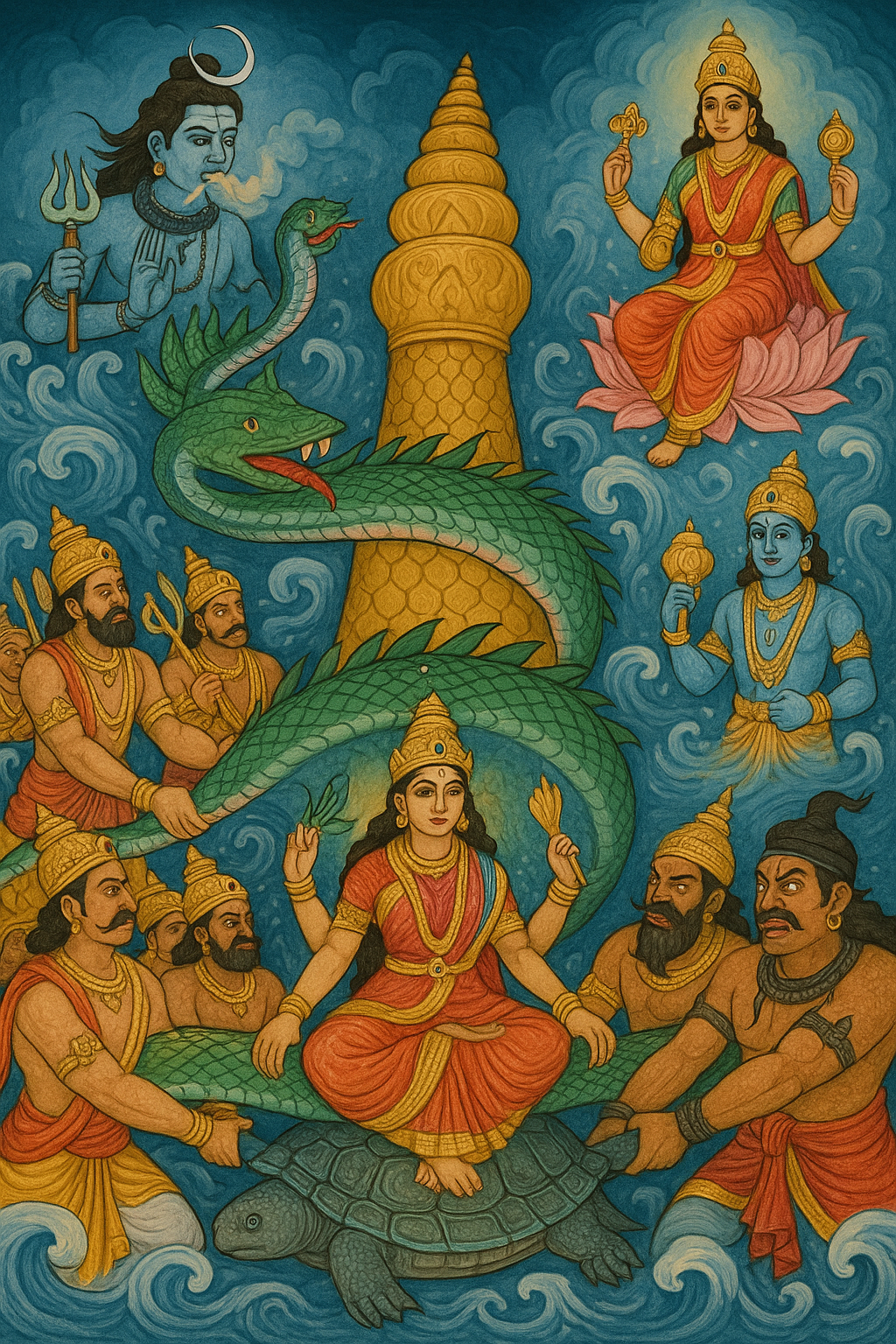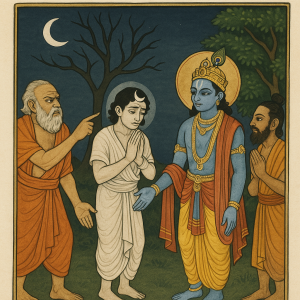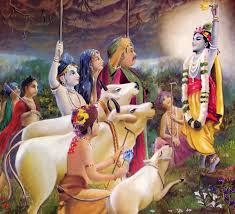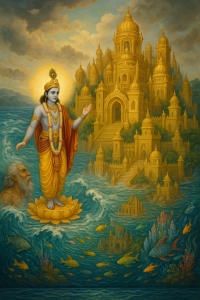The Curse of Durvāsā and the Loss of Prosperity
Once, the great sage Durvāsā, known for his fiery temper and deep devotion, approached Indra, king of the demigods, and offered him a divine garland given by a celestial maiden. Indra, however, carelessly placed it on the trunk of his elephant Airāvata. The elephant, disturbed by the scent, threw it to the ground.
Durvāsā, seeing this as an offense to Lakṣmī, the goddess of fortune, cursed Indra that all his glory, prosperity, and power would be lost.
As a result, the demigods gradually lost their strength, wealth, and position. The asuras (demons), sensing the shift in power, attacked and began to dominate the universe. Indra and the devas, weakened and desperate, approached Lord Viṣṇu for help.
Lord Viṣṇu’s Plan: Churning the Ocean
Lord Viṣṇu, full of compassion, gave them wise counsel:
“To regain strength and immortality, churn the Ocean of Milk to obtain amṛta (nectar of immortality). For this great task, make peace with the asuras and promise them a share of the nectar. I will guide the entire endeavor.”
Though uneasy, Indra agreed. A temporary truce was made with the demons.
Gathering the Ingredients
To churn the ocean, they needed a churning rod and a rope:
- Mount Mandara was chosen as the churning rod.
- Vāsuki, the king of serpents, became the rope.
The demigods and demons together uprooted Mount Mandara and brought it to the shore, but it was too heavy. Seeing their struggle, Lord Viṣṇu appeared as Garuḍa, carried the mountain effortlessly, and placed it in the ocean.
The Churning Begins
The churning began with devas on one side and asuras on the other. Vāsuki, coiled around the mountain, began to burn with the friction, and poisonous fumes were released.
Then, as the mountain sank due to lack of support, Lord Viṣṇu took the form of Kūrma (the divine tortoise) and supported the mountain on His back. Thus, the mountain rotated smoothly as the churning continued.
Emergence of Wonders from the Ocean
As the ocean was churned, various divine treasures appeared, each signifying divine opulence:
- Kāmadhenū – the wish-fulfilling cow.
- Airāvata – the white elephant with four tusks.
- Uccaiḥśravā – the celestial horse.
- Kaustubha-maṇi – the most radiant gem, later worn by Lord Viṣṇu.
- Pārijāta – the celestial tree.
- Apsarās – celestial maidens.
- Varuṇī – goddess of wine, taken by the asuras.
- Dhanvantari – the divine physician, who emerged holding a pot of amṛta.
But along with these came the deadly poison Hālāhala, which threatened to destroy all creation. The devas cried out to Lord Śiva, who compassionately drank the poison and held it in his throat, which turned blue—earning him the name Nīlakaṇṭha.
The Appearance of Lakṣmī-devī
Finally, Lakṣmī-devī, the goddess of fortune, appeared from the ocean, radiant and adorned with celestial beauty. She chose Lord Viṣṇu as her eternal consort, garlanding Him with devotion and love.
The Fight for Amṛta and Lord Viṣṇu’s Mohinī Form
As Dhanvantari appeared with the nectar, a dispute broke out between the devas and the asuras. The asuras snatched the pot and fled.
At that moment, Lord Viṣṇu manifested a most enchanting form—Mohinī-mūrti, a beautiful maiden of divine grace. The asuras, deluded by Her charm, surrendered the pot to Her, believing She would fairly distribute it.
Smiling inwardly, Mohinī gave the nectar only to the demigods, while entertaining the asuras with Her illusion. Rāhu, a cunning asura, disguised himself as a deva and drank a drop, but Sūrya and Candra reported him. Lord Viṣṇu severed his head with His disc. Yet, because he had tasted the nectar, his head and body became Rāhu and Ketu, who later cause eclipses.
Victory of the Devas
Empowered by the nectar, the devas regained their strength, defeated the asuras, and restored dharma in the universe. The asuras, angry at the deception, were cast back into darkness.
All beings glorified Lord Viṣṇu, who orchestrated the entire episode with wisdom and mercy.
Lessons to Be Learned:
- Even adversity serves a divine purpose when guided by the Lord.
- Unity and humility are required to achieve great results, even among rivals.
- Lord Viṣṇu is the supreme orchestrator who protects dharma through many forms.
- Material desires lead to conflict, but those surrendered to the Lord attain real nectar.
- Mohinī-mūrti reminds us that the Lord uses illusion to protect His devotees and bewilder the faithless.
- Śiva’s sacrifice demonstrates compassion and responsibility in times of crisis.
Origin of the Story: Harivaṁśa Purāṇa – Adi-parva, Chapters 21–30



